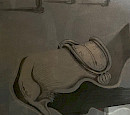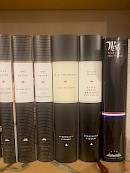-
 24.5.2024
24.5.2024
The unknown Wittgenstein
Ludwig Wittgenstein with his austere, apodictic style of writing was a fascinating figure to me as a student that I couldn’t yet grasp in my immaturity. This might have been due to the fact that I …
read more ...
-
14.3.2024
What is Ambiguity?
Aristotle, Russell or Quine have thought about the theory of meaning and the philosophical applications of the notion of ambiguity for logic, but it was the German mathematician Gottlob Frege who …
read more ...
-
 8.1.2024
8.1.2024
Free will – reality or illusion?
When out on a walk choosing what kind of ice cream to order, choosing which course to take at university or if to smoke a cigarette – are we even free to choose? Or could we have made a different …
read more ...
-
11.12.2023
Children little philosophers III – Kant’s categorical imperative or: Auntie, aren’t you able to lie?
My niece who just turned seven and me love to play a game together, called “Rummy”. This is a game at which players have to lay down sets of tiles in four different colours. The player who doesn’t …
read more ...
-
 31.8.2023
31.8.2023
What is critical thinking?
Enlightenment is man's emergence from his self-imposed immaturity. Immaturity is the inability to use one’s understanding without guidance from another. This immaturity is self-imposed when its cause …
read more ...
-
18.7.2023
Karl Popper’s falsificationism
The quest of the Vienna Circle in the early twentieth century was to develop a new scientific view of the world by combining philosophical and natural scientific questions. On its fringe was Karl …
read more ...
-
 4.4.2023
4.4.2023
Divine Simplicity
What is God1 or who is God? Western religions represent a wide variety of different “churches” or houses of God, but when it comes to the concept of God, they share a common foundation. Christianity …
read more ...
-
 6.12.2022
6.12.2022
The stoic distinction of knowledge and true belief
What is knowledge1, what is true belief and what condition is constitutive of knowledge or belief? Philosophers such as Parmenides of Elea, Plato or Popper deal with the philosophical meaning of …
read more ...
-
 22.10.2022
22.10.2022
Metaphysics – Ontology – Epistemology
The three main branches of philosophy Metaphysics, Ontology and Epistemology are concerned with the question of how science is to be understood philosophically and how we can know anything. While the …
read more ...
-
16.6.2022
Substance – Accident (Aristotle)
„Being [ὂν] is spoken of in many ways [...]. For one type of being signifies the what-it-is [τί ἐστι] and a this [τόδε τί]; another signifies quality, or quantity, or any of the other things …
read more ...
-
 12.4.2022
12.4.2022
The distinction between universals and particulars
Aristotle purports that humans began to engage in philosophy because they wondered about the things right in front of them and because of greater puzzling things (Met. I 2, 982b12). The big trio of …
read more ...
-
 2.3.2022
2.3.2022
Plato’s Allegory of the Cave (Republic VII, 514a-517c)
One of the passages that Plato is most famous for is the Allegory of the Cave in his Republic. This masterpiece of rhetorical ingenuity describes how people living in a cave do take the illusion of …
read more ...
-
22.1.2022
Children – Little philosophers. A philosophical conversation with my 16-year old nephew about the question: Why living the good life in the eyes of God?
My teenage nephew recently told me about an American series (Breaking Bad) centered on a chemistry teacher who suffers from lung cancer and becomes a drug lord out of necessity. He then went on to …
read more ...
-
 25.11.2021
25.11.2021
What is time?
„So it is – the life we receive is not short, but we make it so, nor do we have any lack of it, but are wasteful of it.” (Seneca: De brevitate vitae. I,4) Whether you’re strolling leisurely alongside …
read more ...
-
 30.9.2021
30.9.2021
Philosophy as therapy
„Now if at our birth nature had granted us the ability to discern her, as she truly is, with insight and knowledge, and under her excellent guidance to complete the course of life, there would …
read more ...
-
4.6.2021
Why should I be good?
One of the core ethical questions is “Why should I or why should we be good?” And what does “good” even mean? The question of why I or we should be good calls forth two different meanings of “good”: …
read more ...
-
 14.4.2021
14.4.2021
What is Cartesian Dualism?
Earlier thinkers such as Plato, Aristotle or Thomas of Aquinas have thought about the metaphysical status of the soul and the relationship between mind and body, but it was the French philosopher …
read more ...
-
24.2.2021
Alfred North Whitehead (1861-1947): Process philosophy and how to solve the mind-body problem
Bertrand Russell’s friend and colleague1 Alfred North Whitehead is one of the most forward thinking philosophers but hardly known beyond the world of science. This may be due to his erudite nature …
read more ...
-
27.1.2021
Locke's Tabula rasa
The British empiricist John Locke expounds the conditions of knowledge in his Essay Concerning Human Understanding (1690) and denies innate ideas in human reason. He holds that as a „rational …
read more ...
-
 17.11.2020
17.11.2020
Short biographical sketch of Plato
Aristocles, better known under his nickname “Plato” deriving from his flat-shaped rather sizeable forehead, was born around 427 BC from Athenian nobility and set out to become one of the most …
read more ...
-
 30.9.2020
30.9.2020
Children – Little philosophers. A philosophical conversation with my 4-year-old niece about self-determination and the place of the soul
Introductory thoughts on the philosophical conversation of Plato’s Socrates: Plato’s early dialogues are characterized by the way how Socrates conducts conversations (Socratic maieutics). They aim to …
read more ...
-
 27.7.2020
27.7.2020
Adam Smith – massively misunderstood
„It is the best head joined to the best heart.” Adam Smith: TMS, VI, i, 15. Adam Smith’s name shines like a beacon in the night when it comes to economics and moral philosophy but who would have …
read more ...
-
4.6.2020
Moral Claims – Ideal and Reality
How come that heads of state and CEOs of large corporations can still exercise power without any fear of being sanctioned even though they publicly displayed unethical behaviour? One would assume …
read more ...
-
29.4.2020
Overcoming philosophy as egology and how to learn from it in this time of crisis
The starting point for the Jewish philosopher Emmanuel Lévinas lies within the German phenomenology of Husserl and Heidegger in which he aims to overcome with a different ontological approach. He …
read more ...
-
24.3.2020
Conviction – in Rhetoric and Philosophy
“Nihil probat, qui nimium probat.” Why is it that we humans of the 21st century are still blinded by the illusion of the homo oeconomicus when we are forming an opinion? What exactly is conviction …
read more ...
-
 20.2.2020
20.2.2020
My favourite books about rhetoric so far
Stephen J. McKenna: Adam Smith. The Rhetoric of Propriety. Albany: State University of New York Press, 2006. A must-read for those interested in rhetoric. McKenna is analysing Smith‘s theory of …
read more ...
-
20.11.2019
“It wasn’t appropriate for us to be seen” – Prince Andrew’s interview with the BBC
The consequences of one small word may be known to savvy lawyers but it can become a true stumbling block for others such as politicians, famous people and aristocrats with the potential of …
read more ...
 24.5.2024
24.5.2024 8.1.2024
8.1.2024 31.8.2023
31.8.2023 4.4.2023
4.4.2023 6.12.2022
6.12.2022 22.10.2022
22.10.2022 12.4.2022
12.4.2022 2.3.2022
2.3.2022 25.11.2021
25.11.2021 30.9.2021
30.9.2021 14.4.2021
14.4.2021 17.11.2020
17.11.2020 30.9.2020
30.9.2020 27.7.2020
27.7.2020 20.2.2020
20.2.2020